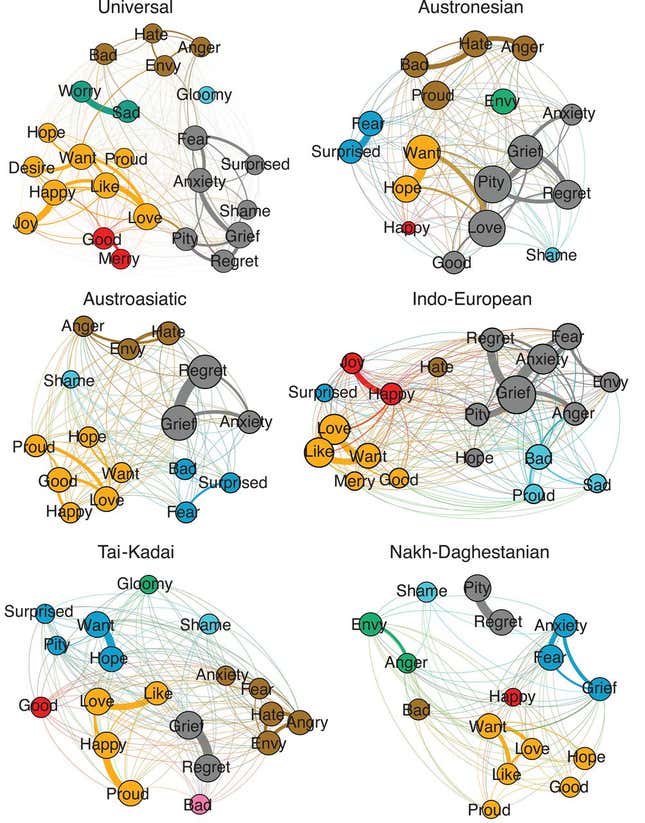The study of language can also be described as the study of reality.
Human societies may be universally aware that the sun exists, and pretty much all languages have a word for it. But when it comes to less concrete or more conceptual experiences, language becomes trickier. Do we all differentiate—and see—the same colors, for example? And when it comes to emotions, things get even more complex. Most languages have a word for “love,” but does that mean love is conceptually the same everywhere?
A new study from the University of Otago in Dunedin, New Zealand, has found some compelling evidence that emotional concepts are different for different language groups. Researchers studied which words in any given language were related semantically to other words in the same language, and then compared those groupings to each other. The groupings, they discovered, varied significantly.
In one example, Persian uses the word-form ænduh to express both the concepts of grief and regret. Meanwhile in the Sirkhi dialect of Dargwa, a language spoken in the Russian republic of Dagestan, the word-form dard expresses the concept of grief, but also that of anxiety.
“Persian speakers may therefore understand ‘grief’ as an emotion more similar to ‘regret,’ whereas Dargwa speakers may understand ‘grief’ as more similar to ‘anxiety,'” the researchers wrote in their paper, published in the journal Science this month. Perhaps unsurprisingly, languages from similar geographic regions were more likely to display connections between similar emotion words. Proximal societies have more opportunities for trade and other cross-cultural exchange, and more recent shared histories.
Many of the subtle differences are literally lost in translation, as the imperative for dictionaries to find translations erases the nuanced ways in which a culture uses a word and, perhaps, experiences the emotion. According to the study:
Emotion concepts had different patterns of association in different language families. For example, “anxiety” was closely related to “fear” among Tai-Kadai languages, but was more related to “grief” and “regret” amongst Austroasiatic languages. By contrast, “anger” was related to “envy” among Nakh-Daghestanian languages, but was more related to “hate,” “bad,” and “proud” among Austronesian languages. We interpret these findings to mean that emotion words vary in meaning across languages, even if they are often equated in translation dictionaries.
A good example of this equation is the German word Sehnsucht. Google translate offers “nostalgia” as the direct translation. Other dictionaries come up with longing, yearning, pining, hankering, and desire. In fact, the researchers note, the word “refers to a strong desire for an alternative life and has no direct translation in English.”
Links across languages
In order to make the comparisons, the researchers constructed what they call a “colexification database” that included word lists from 2,474 global languages. One major challenge, they wrote, was to ensure no false relationship between words were included, for example in cases where a word in a language is used to mean several different things. (The English word “like,” which can mean “similar to” but also denote a positive feeling towards something, is a good example.) They also pointed out that the most widely spoken languages are also the best-documented. For this reason they used word lists rather than dictionaries, giving them access to more languages.
Computer programs analyzed the word-pairs and created visualizations of different language groups, highlighting their differences:

The existence of subtle differences doesn’t mean human societies have wildly divergent experiences, the researchers note. For the most part, words with positive associations grouped together, and those with negative associations were also conceptually linked to one another. An interesting exception, the researchers wrote, was that some Austronesian languages colexified the concepts of pity and love. That implies those cultures conceptualize pity as more positive than others—or love as more negative.
